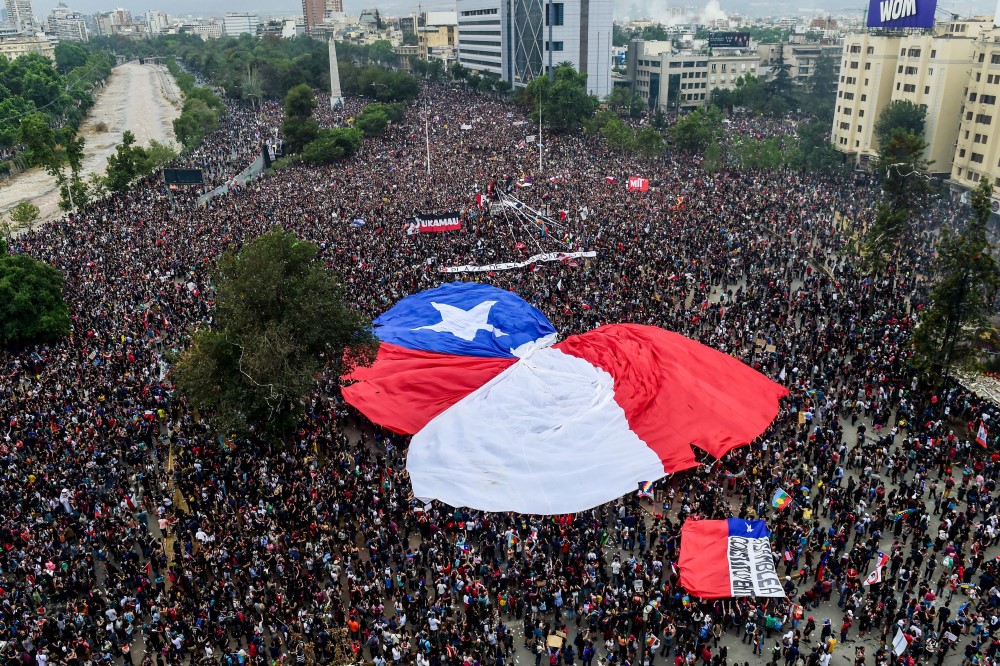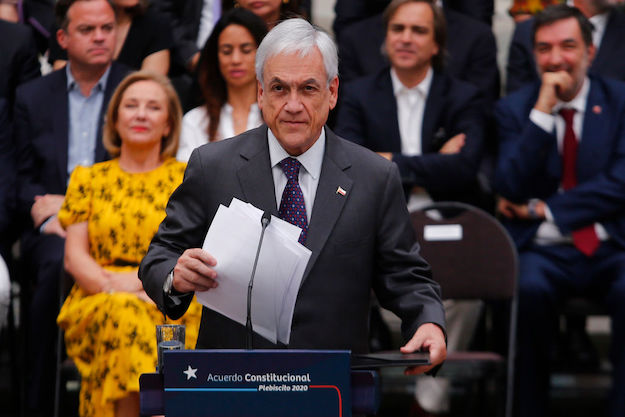During a recent visit to Santiago, as massive street protests in the city entered their third month, most of the journalists, activists, academics and politicians I spoke to conceded that Chile was in far deeper trouble than many observers abroad seemed to realize.
The demonstrations and resulting government crackdown that made global headlines in October have largely fallen off the international radar, as Latin America watchers have moved on to social unrest in Colombia, the new government in Argentina and the recently finalized U.S.-Mexico-Canada Agreement (USMCA). Rather than a lack of interest – as has been the case with other crises in the region, such as in Haiti – the diminishing attention on Chile has been a matter of benign neglect, the product of a broad consensus that the country is well-positioned to overcome its current challenges.
For a long time, many in Chile shared this view. A former policymaker I spoke to admitted that flattering articles in publications such as The Economist had contributed to overconfidence among Chilean elites, making them less receptive to the frustration and rage that was slowly accumulating on the streets. On Oct. 17, in a now infamous interview with The Financial Times, President Sebastián Piñera proudly described Chile as an “oasis” in the midst of political upheaval across Latin America. Just 24 hours later, large-scale protests erupted in the capital, with graffiti reading “Chile was never an oasis,” “Eat the rich” and “All cops are bad” covering the neighborhood around the presidential palace. “The problem was blindness. We did not want to see, or we chose perspectives that did not allow us to see,” Pedro Güell, a sociologist at Alberto Hurtado University and director of public policy during the Bachelet administration, wrote in Mensaje magazine.
In most of Latin America, observers have placed considerable faith in Chile’s institutions and in its capacity to address the multitude of concerns voiced by angry citizens. After the first week of demonstrations, AQ’s politics editor Roberto Simon raised the question of whether, after initially struggling to adapt, Chile’s democracy was “finally offering concrete answers to (protesters’) demands.” Piñera’s decision to cede to public pressure and announce a plebiscite over whether to write a new constitution was welcomed at home and abroad as a step toward solving the crisis.
A growing divide
But after the initial excitement around Piñera’s decision, Chile’s leftist social movements have become deeply divided between those who despise him and seek a total victory, and those who defend a more pragmatic, conciliatory approach. The squabble does not bode well for the left’s capacity to work together in coming years, as Chile edges closer to drafting a new constitution.
The whole situation is eerily reminiscent of recent history in Brazil. There, anti-establishment politicians such as President Jair Bolsonaro ended up as the biggest beneficiaries of the generalized rage against political elites expressed during the 2013 protests. Indeed, fringe politicians in Chile seem most upbeat about the current crisis. José Antonio Kast, a far-right politician nostalgic about the Pinochet dictatorship, has depicted the wave of protests as little more than a law-and-order problem produced by vandals and anarchists. Kast quickly embraced a simplistic but easy-to-remember message about how to address the problem. As one of his advisers told me, the longer the general perception of a lack of public order persists, and the deeper Chile’s economic difficulties, the better are Kast’s chances for an election triumph in 2021.
Piñera, who is supported by only one in 10 Chileans, is now being forced to implement an agenda many on the center-right oppose, including an increase in public spending and stopping or even rolling back pro-business reforms. “Scared by the protests, the president has been co-opted by the left,” the Kast adviser told me. Even allies do not expect the president’s approval ratings to recover until the end of his term. In 2013, Dilma Rousseff’s 60% approval ratings plummeted during the protests and never recovered. Just like Brazil then, Chile today faces a dangerous leadership vacuum that radicals will be eager to fill.
To make matters worse, many Chileans are expected to lose their jobs in coming months as a result of the economic toll of the protests, a process that is likely to exacerbate an already polarized environment. Investors may similarly be wary of Chile until there is more clarity on the constitution-writing process and any potential changes to the country’s economic and political model. On the streets, conspiracy theories about Venezuelan meddling to fuel the protests abound. After I told a Venezuelan cab driver in Santiago that I had recently visited Caracas, he grew suspicious and repeatedly asked whether I was part of a Maduro initiative to destabilize Chile.
And yet, just like in Brazil, Chile’s protests have sparked something profoundly positive, too. The 2013 protests in Brazil irreversibly changed the way young people relate to politics, giving rise to a new crop of activists who are politically engaged and fight for social causes like LGBT rights; many plan to run for office or have already started working on political campaigns. In the same way, Chile is experiencing an unprecedented wave of public debate about classism, misogyny, inequality, police violence, poor public services, low pensions, a lack of meritocracy, elite privilege and impunity. A general sense of disenfranchisement has surged, creating a fascinating array of discussions about what kind of country Chileans want to live in. The fact that the majority of the population still supports the protests shows how profound the desire for change really is.
Comparing Brazil’s protests in 2013 to those in Chile today, Thomas Traumann, who was Rousseff’s spokesperson at the time, recently offered Chileans three lessons. First, “nothing will ever return to normal.” Second, “people will not necessarily wait for the electoral calendar to try to remove a public official from office.” Third, “in this new polarized society, where arguments are replaced by shouting, the possibility of a consensus is almost nil.” It is no surprise that Chile’s fringe politicians are already studying their Brazilian counterparts. In order to avoid Brazil’s fate, those in the center would do well to do the same.









